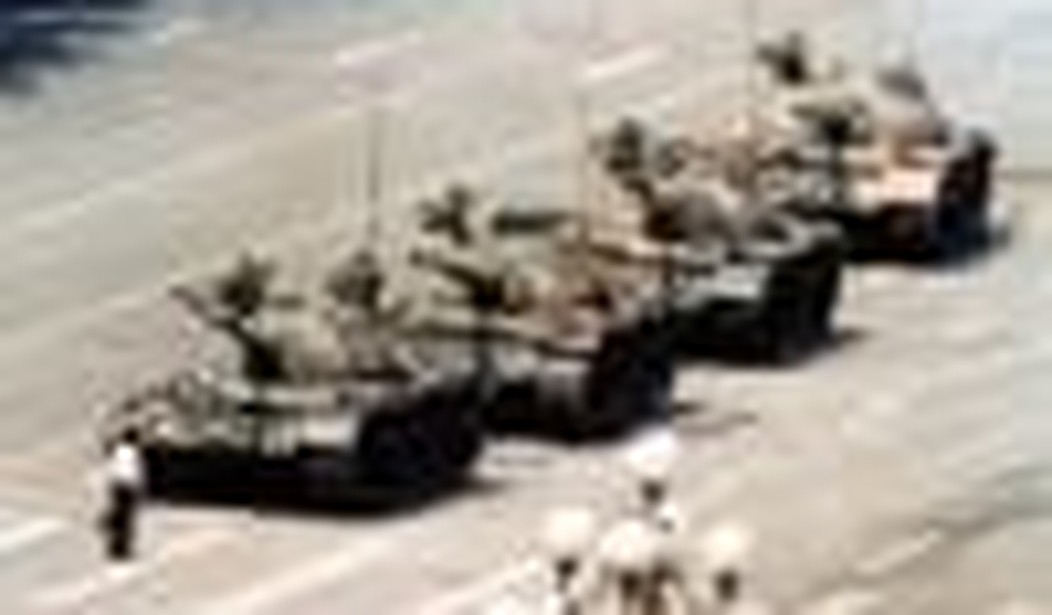Chai Ling was one of the leaders of the 1989 student protests in Tiananmen Square. Since her escape to the West, she has become one of the prominent exile opponents of Chinese governmental tyranny, including most notably its brutal one child per family policy. In A Heart for Freedom, she tells her story.
The outline of Chai’s account runs as follows. She was born in a small seaside fishing village. Her parents were the local doctors, committed communists and officers in the People’s Liberation Army, dedicated to a life of public service.
Excelling at school, she won the village scholarship to attend Peking University — China’s Sorbonne — a great honor that filled all of her family — even her demanding father — with pride. At the university, her experiences and ideas expanded, ultimately leading her into participation and then leadership of student protest movement.
Named by the government as the number two “culprit” in the Tiananmen Square events, she was forced to go underground following the crackdown, and after a year on the run, made a daring escape from China to Hong Kong. She then made her way to France then to the United States, where she was embraced by allies as diverse as Senators Edward Kennedy (D-MA) and Malcolm Wallop (R-WY), and given scholarships to Princeton and Harvard. Then, overcoming Chinese government blackballing to make her way into the business world, she found both financial success and a loving husband who encouraged her conversion to Christianity. Putting her fortune to good use, she then founded the All Girls Allowed organization, committed to fighting the one-child policy and its resulting “gendercide” in China.
One of most intense parts of the book is that dealing with the Tiananmen Square protests. Chai’s recounting of those events is fragmentary, but all the more compelling for that reason, as she tells the story not as seen by historians, but as seen, felt, and understood by her at that time. (This is her style throughout the book, so that, for example, when she speaks of her youth, we see the world through the eyes of a girl from a fishing village, who believes in ghosts and spirits, rather than from the sophisticated vantage of an Ivy League graduate.)
The chaos and confusion of radical student politics is there, the conflicting egos and factions, the trivial incitements with extraordinary consequences, the rapid oscillations between ideas, and shifts of alternating moods of resolution and panic. It is clear that the students are totally out of their depth. They have fragments of anecdotal knowledge of outside world history, but no coherent understanding of political theory, not from Locke or Madison, or even Lenin, so they don’t know what they are fighting or how to fight it. Thus while the student leaders wear headbands inscribed “Give Me Liberty or Give Me Death,” their ultimatum to the government threatens it with their own death by hunger strike — a tactic which certainly would not have appealed to Patrick Henry or the Minutemen.
They hate the totalitarian system’s innumerable petty tyrants, like the cop who confiscates Chai Ling’s wristwatch for himself, but some of their leaders give speeches calling for the emulation of Chairman Mao. Another student attempts an oration modeled on Martin Luther King’s “I have a dream.” He is jeered off the podium. As PLA troops are gathered around the city, Chai Ling calls for sending delegations to try to win them over, but the other student leaders see no merit in the idea. Then the army enters the city, and shooting its way towards the square, throws the students into their climatic crisis. Should they disperse and be hunted down individually in obscurity, or stand their ground so that the whole world will bear witness to their massacre? At first they elect to hold in place, but as the oncoming slaughter grows near, the horrific threat becomes too great, and with Chai and the other leaders at the front, they march out of the square singing “The Internationale.”
There is much food for thought here. Certainly it is understandable that China’s rebels should frame their opposition to the regime not with an alternative set of ideals, but with its failure to live up to its own. But perhaps we can help their successors do better next time, by offering American university scholarships not just to Chinese engineers, but to political science and history students as well.
The other equally compelling side of the book is its account of Chai’s internal odyssey, which took her from Marxism through Buddhism to Christianity. This is delivered in an intensely personal way, as is her discussion of the one-child policy, which subjected her to repeated forced abortions and concomitant feelings of personal guilt, which she had to overcome through the deepest efforts of her soul.
For those who wish to really understand China, A Heart for Freedom is a must read.









Join the conversation as a VIP Member